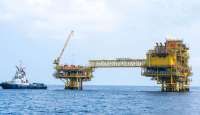PAPUA - MELBOURNE. Global giants ExxonMobil Corp and France's Total SA have reached broad agreement on plans to double gas exports from Papua New Guinea, their partner Oil Search Ltd said on Tuesday.
The plan to expand the ExxonMobil-operated Papua New Guinea liquefied natural gas (LNG) plant to around 16 million tonnes per annum (mtpa) would see it rival Australia's biggest LNG projects, at a cost of around $13 billion, according to analysts.
Oil Search said the companies plan to add three new LNG units, or trains, with two underpinned by gas from the Elk-Antelope fields, run by Total, and one underpinned by existing fields and the new P'nyang field, run by Exxon.
"There's no doubt that keeping it simple is one of the great advantages of the concept that is presently on the table," Botten told analysts after the company reported a near threefold rise in annual core profit.
"It also allows a smart way of both marketing gas and financing."
The partners aim to start engineering and design work in the second half of this year, but first need the PNG government to approve the plans.
"Joint venture alignment challenges remain, and shouldn't be underestimated," said Saul Kavonic, an analyst with consultants Wood Mackenzie.
The expansion is expected to be much cheaper than the original $19.5 billion cost of building the PNG LNG plant. Botten declined to comment on the latest cost estimates.
Bernstein analysts estimate the 8 mtpa of new capacity could be added for between $12 billion and $14 billion, or around $1,600 a tonne.
That would be less than half the per tonne cost of Chevron Corp's Gorgon LNG plant in Australia, which is slightly smaller than the expanded PNG LNG plant would be.
Australia's other major LNG plant is the Woodside-operated North West Shelf, which has annual production of just under 16 mtpa.
"This is the big shift in the next cycle of the PNG-Australian LNG story. It's very much about lower cost, brownfield, backfill developments," Bernstein analyst Neil Beveridge said.
The partners in Papua New Guinea are racing to start producing from the new trains by the mid-2020s, when the LNG market is expected to slide into deficit due to rapidly growing demand in Asia and a lack of other new projects.
"We believe we're marketing at a perfect time for PNG LNG and Papua LNG to secure these markets," Botten told analysts.
He was speaking after Oil Search reported core profit for 2017 rose to $302.1 million from $106.7 million a year earlier, on the back of sharply higher oil and gas prices and higher sales.
The result was just below analysts' forecasts around $310.3 million, according to Thomson Reuters I/B/E/S.
/2018/02/02/296302456p.jpg)









